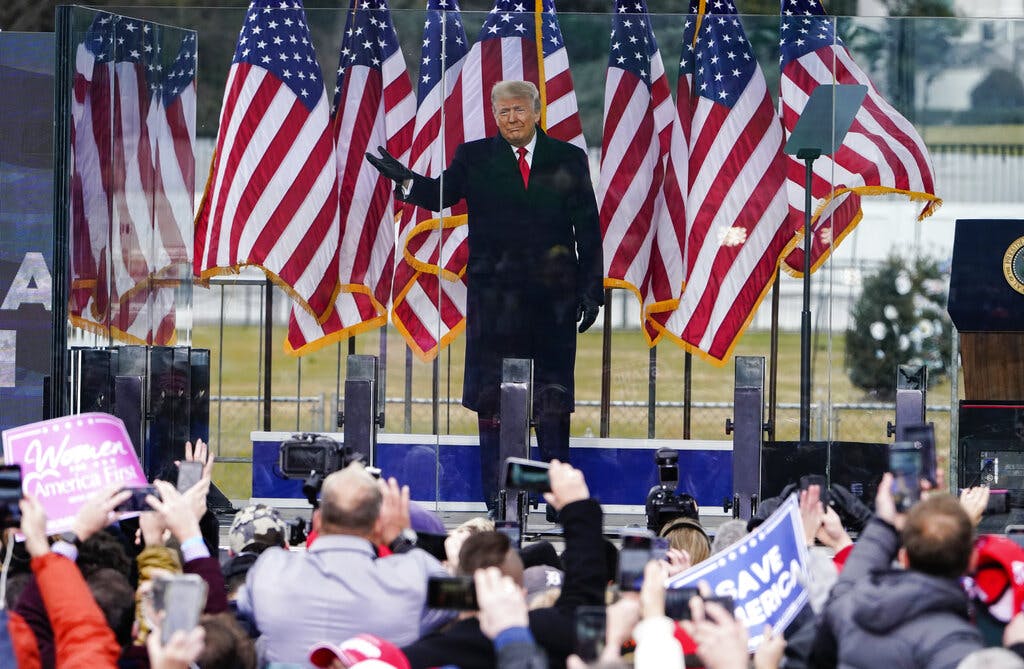Trump Believes With ‘100 Percent Certainty’ That He Won the 2020 Election, His Impeachment Lawyer Tells the Sun
That point — whether there was criminal intent — is emerging as a key question as Jack Smith readies indictment of the 45th president over January 6.

The report that Special Counsel Jack Smith’s office met with President Trump’s son-in-law, Jared Kushner, raises a question whose answer could determine if Mr. Trump spends the next four years in the White House or the big house — namely, did Mr. Trump truly believe the election was stolen?
The meeting between Mr. Kushner and prosecutors, reported by the New York Times, underscores that Mr. Smith has picked the lock of Mr. Trump’s inner — and family — circle. As he does so, he appears to be trying to learn the former president’s state of mind during the weeks before January 6, 2021.
The Sun spoke to the attorney who represented Mr. Trump in his second impeachment trial, David Schoen. He secured the former president a “not guilty” verdict in the Senate on the charge, which was “incitement to insurrection.” Mr. Schoen discloses that “outside and inside, 24 hours a day,” Mr. Trump asserted that “there was election fraud.”
Mr. Schoen says of Mr. Trump: “I know this guy pretty well and speak very candidly with him,” and Mr. Trump believes with “100 percent certainty” that he won the election. Mr. Schoen notes that “it’s not like I’m guessing” when it comes to Mr. Trump’s state of mind and view of the integrity of the vote. He explains that this conviction provides Mr. Trump his “firmest ground” in fighting charges that rely on intent.
The Times reports that Mr. Smith’s team homed in on “whether Mr. Trump had privately acknowledged in the days after the 2020 election that he had lost.” The dispatch adds that it is believed that Mr. Kushner told prosecutors that the grandfather of his three children sincerely believes the election was stolen, the same assertion made by Mr. Schoen.
An opposing view was offered by a one-time White House aide, Alyssa Farah Griffin, who told the January 6 committee — and Mr. Smith’s office — that Mr. Trump spent the days after the 2020 election befuddled at the outcome, wondering how he was bested by President Biden.
“In that moment,” Ms. Griffin related, “I think he knew he lost.”
Ms. Griffin added to CNN that Mr. Trump “told me shortly after that he knew he lost, but then, you know, folks got around him.” She hedged, though, adding that other advisers “got information in front of him, and I think his mind genuinely might have been changed.”
Another aide, Cassidy Hutchinson, told the January 6 committee that her boss, a former White House chief of staff, Mark Meadows, told her that “a lot of times he’ll tell me that he lost” and “he pretty much has acknowledged that he’s lost.” Those reflections, though, would be inadmissible at trial as hearsay.
Much could turn on whether Ms. Griffin or Mr. Kushner — who both testified under oath — are correct in their read of the 45th president’s faith that he triumphed in 2020. That is because armchair psychology, if observed first hand, can double as courtroom evidence of Mr. Trump’s state of mind and, ultimately, his criminal culpability. Ignorance, in this scenario, could be bliss.
If Mr. Smith appears to be moonlighting as a psychologist, it is because a prosecutorial showing of mens rea — a Latin phrase that the English-speaking legal community uses to mean “guilty mind,” or criminal intent — on the part of a defendant is an indispensable feature of securing a conviction for most crimes. As Justice Oliver Wendell Holmes once put it, “even a dog knows the difference between being stumbled over and being kicked.”
In a 1994 case, Staples v. United States, the court affirmed that “[t]he existence of a mens rea is the rule of, rather than the exception to, the principles of Anglo-American criminal jurisprudence.” At the same time, though, “ignorance of the law or a mistake of law is no defense to criminal prosecution.”
Even the “model prosecution memorandum” published this week by a liberal group, Just Security, which is bullish on prosecuting Mr. Trump, limits itself to possible crimes that “would not require a jury to find that Trump knew that he had lost the election.” They allow that “avoiding such an argument” would “make trying any such case simpler.”
Intent, though, will not be so easy to evade. One potential charge, 18 United States Code § 1512, prohibits obstruction of an official proceeding and requires a defendant to act “corruptly.” While an appellate court found that the provision could be used to prosecute January 6 rioters, they fractured when it came to marking out the parameters of a corrupt intent.
Another statute under which Mr. Trump could be prosecuted, 18 United States Code § 1001, which prohibits making false statements to federal authorities, requires that prosecutors show that a defendant misled “knowingly and willfully.” Department of Justice guidance concedes that “willfully” mandates that the defendant “acted with knowledge that his conduct was unlawful.”
These are the hurdles that Mr. Smith will have to clear before a jury convicts Mr. Trump, though Mr. Schoen tells the Sun that the dislike of the former president is so pervasive in the District of Columbia that prosecutors could “charge him with anything” and secure a conviction.
Notwithstanding the intricacies of Mr. Trump’s intent, Mr. Schoen left the Sun with the observation that there is “no basis whatsoever for the charges” and that they are “an affront to the First Amendment.”

